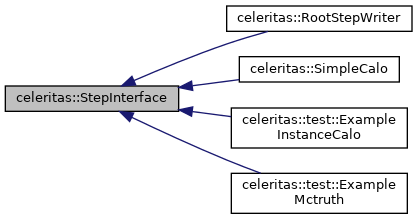|
Celeritas 0.7.0-dev.355+develop.c94c428
|
|
Celeritas 0.7.0-dev.355+develop.c94c428
|
Callback class to gather and process data from many tracks at a single step. More...
#include <StepInterface.hh>

Classes | |
| struct | Filters |
| Filtering to apply to the gathered data for this step. More... | |
Type aliases | |
| using | HostStepState = StepState< MemSpace::host > |
| Detector filtering required for this interface. | |
| using | DeviceStepState = StepState< MemSpace::device > |
| Detector filtering required for this interface. | |
| using | MapVolumeDetector = std::map< VolumeId, DetectorId > |
| Detector filtering required for this interface. | |
| virtual Filters | filters () const =0 |
| Detector filtering required for this interface. | |
| virtual StepSelection | selection () const =0 |
| Selection of data required for this interface. | |
| virtual void | process_steps (HostStepState)=0 |
| Process CPU-generated hit data. | |
| virtual void | process_steps (DeviceStepState)=0 |
| Process device-generated hit data. | |
| ~StepInterface ()=default | |
| Detector filtering required for this interface. | |
Callback class to gather and process data from many tracks at a single step.
The filtering mechanism allows different step interfaces to gather data from different detector volumes. Filtered step interfaces cannot be combined with unfiltered in a single hit collector. (FIXME: maybe we need a slightly different class hierarchy for the two cases?) If detectors are in use, and all StepInterface instances in use by a StepCollector select the "nonzero_energy_deposition" flag, then the StepStateData::detector entry for a thread with no energy deposition will be cleared even if it is in a sensitive detector. Otherwise entries with zero energy deposition will remain.
Detector filtering required for this interface.
Implemented in celeritas::GeantSd, celeritas::RootStepWriter, celeritas::SimpleCalo, celeritas::test::ExampleInstanceCalo, and celeritas::test::ExampleMctruth.
|
pure virtual |
Process device-generated hit data.
Implemented in celeritas::GeantSd, celeritas::RootStepWriter, celeritas::SimpleCalo, celeritas::test::ExampleInstanceCalo, celeritas::test::ExampleMctruth, celeritas::GeantSd, celeritas::RootStepWriter, celeritas::SimpleCalo, celeritas::test::ExampleInstanceCalo, and celeritas::test::ExampleMctruth.
|
pure virtual |
Process CPU-generated hit data.
Implemented in celeritas::GeantSd, celeritas::RootStepWriter, celeritas::SimpleCalo, celeritas::test::ExampleInstanceCalo, celeritas::test::ExampleMctruth, celeritas::GeantSd, celeritas::RootStepWriter, celeritas::SimpleCalo, celeritas::test::ExampleInstanceCalo, and celeritas::test::ExampleMctruth.
|
pure virtual |
Selection of data required for this interface.
Implemented in celeritas::GeantSd, celeritas::RootStepWriter, celeritas::SimpleCalo, celeritas::test::ExampleInstanceCalo, and celeritas::test::ExampleMctruth.